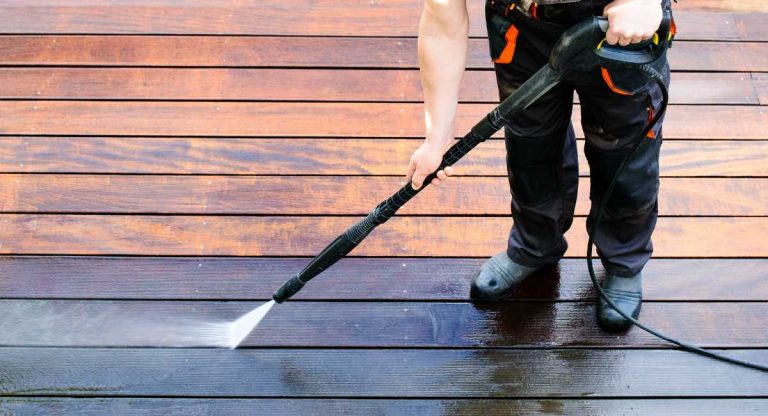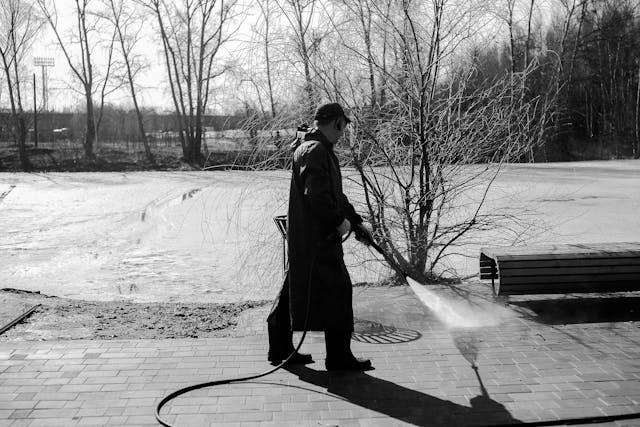
When hiring a power washing service, one of the first things you’ll notice is that companies structure their pricing in different ways. Some charge by the hour, while others offer a flat rate for the job. At first glance, it might not seem like a big deal — but the payment structure you choose can impact the total cost, the quality of work, and even your overall satisfaction. 💰🧽
So which option is better? Should you go with the certainty of a flat rate or the potential flexibility of hourly pricing? Let’s break it down to help you make the smartest choice for your budget and your property. 🧠🏠
⏳ Understanding Hourly Power Washing Rates
Hourly rates are straightforward: the company or contractor charges you a set fee for every hour they’re on the job. This model is usually somewhere between $50 and $150 per hour, depending on the region, equipment used, and complexity of the task.
Pros of hourly pricing:
✅ Ideal for small or unpredictable jobs
✅ Encourages efficiency (in theory)
✅ You only pay for the time actually spent working
Cons:
❌ Costs can spiral if the job takes longer than expected
❌ Difficult to estimate final cost upfront
❌ Can incentivize rushing if time is capped
❌ May include downtime or setup in billed time
If your power washing needs are relatively light — like just a small patio or driveway — hourly pricing might save you money. But if the job is more extensive or complex, it can quickly become a budgeting headache. 💸
💰 Understanding Flat-Rate Power Washing Fees
Flat-rate pricing means the company gives you a total cost upfront for the job, no matter how long it takes to complete. This model is commonly used for residential work like house washing, roof cleaning, or full driveway restoration.
Pros of flat rates:
✅ No surprises — you know the total cost up front
✅ More accountability for quality and thoroughness
✅ Easier to compare quotes between companies
✅ Ideal for large or multi-surface jobs
Cons:
❌ Might cost more than an hourly rate for smaller jobs
❌ Some companies pad flat rates to protect themselves from long hours
❌ Less flexibility if the scope changes mid-job
Flat-rate pricing tends to work best when the job is well-defined — such as “power wash entire 2-story house” or “clean concrete driveway and back patio.” You’re paying for a result, not for time. 💯
🧼 What Impacts Job Duration?
If you’re considering an hourly rate, it’s important to understand what can make the job take longer — and drive up your cost:
🧱 Surface type: Porous or textured surfaces (like brick or stucco) take longer to clean
💦 Water access: Limited access to water hookups can slow things down
🔧 Setup time: Equipment unloading, hose setup, detergent prep — it all adds up
🌿 Obstructions: Landscaping, furniture, or debris may need to be moved
☀️ Weather: High heat or unexpected rain can delay progress
With flat rates, these factors are the contractor’s problem. With hourly, they become yours. 😬
Browse Amazon Here For Top Rated Power Washers And Accessories
🔍 What Are You Actually Paying For?
Sometimes, hourly and flat-rate quotes differ because you’re not paying for the same things. Always ask for clarity on what’s included in the price:
- Is pre-treatment or detergent included?
- Will they move outdoor furniture or cover delicate areas?
- Are post-cleaning touch-ups included?
- Do they handle cleanup and water disposal?
Get the full scope in writing before deciding which pricing model works best. 📋🖊️
🤔 Flat Rate vs. Hourly: Which Is Better for You?
Here’s a quick guide based on common scenarios:
| Situation | Best Pricing Model |
|---|---|
| Full home exterior cleaning | Flat Rate ✅ |
| One-time driveway refresh | Hourly ✅ |
| Gutter and siding combo cleaning | Flat Rate ✅ |
| Small job (porch or steps) | Hourly ✅ |
| Apartment or condo with HOA regulations | Flat Rate ✅ |
| Roof cleaning or deck restoration | Flat Rate ✅ |
| You’re not sure how dirty the surface is | Flat Rate ✅ (safety) |
In most cases, flat rates offer better protection and predictability. Hourly may save a few bucks on small jobs, but can get risky for anything involving multiple surfaces or potential surprises.
💬 What to Ask Before Choosing
Whether you’re comparing quotes or just asking questions over the phone, here’s what to ask:
- “Do you charge hourly or flat rate for this type of job?”
- “What exactly is included in that rate?”
- “How long do you estimate this job will take?”
- “If hourly, how do you track and report time spent?”
- “Is there a minimum charge?”
Asking these questions shows you’re informed — and helps weed out companies that rely on vague pricing or bait-and-switch tactics. 🎯
📉 Avoiding Pricing Pitfalls
Regardless of the structure, beware of:
🚫 “Too good to be true” low hourly rates — they often lead to extended job times
🚫 No written estimate — verbal agreements are risky
🚫 Contractors who won’t commit to any maximum cap on hourly jobs
🚫 Flat rates that leave out essential parts of the job (like detergent or sealing)
A reputable power washing contractor will offer transparent, itemized pricing whether they charge hourly or by the job. ✅
📌 Final Thoughts: Clarity Over Cost
At the end of the day, the best pricing model is the one that gives you confidence in what you’re getting — not just what you’re paying. Flat-rate pricing tends to be more customer-friendly for most projects, but a well-communicated hourly rate can work fine for smaller jobs. Just make sure expectations are clear on both sides. 🧽🤝
Whether it’s a full exterior makeover or just a spruced-up driveway, knowing how you’re being charged helps you avoid surprises — and ensures you get every dollar’s worth.
Browse Amazon Here For Top Rated Power Washers And Accessories






